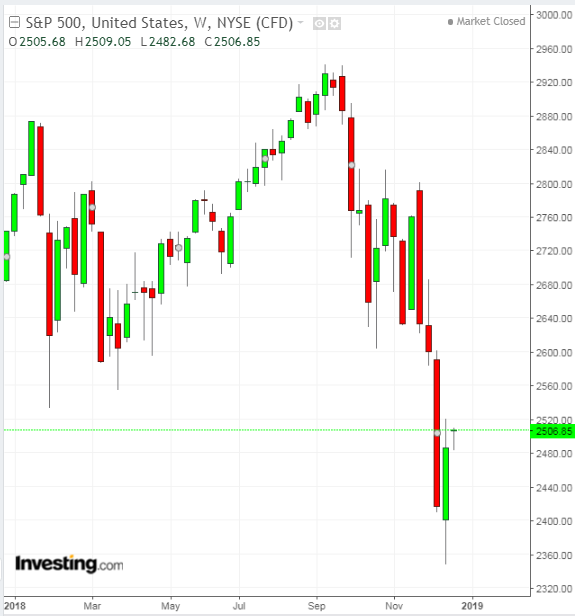With so many moving parts in play, it's difficult to predict how 2019 will shape up for equity investors. The Dow, S&P 500 and NASDAQ all finished the year lower than where they'd started at the beginning of January 2018. And hyper-growth tech stocks, along with other growth-oriented equities took a beating as the year—and markets—wound down.
One thing is clear however: the new year won’t be any less volatile.

We believe three macro factors will be the primary, directional drivers for financial markets as 2019 begins:
1. How quickly will the US and China be able to reach a trade deal that could help equity investors visualize the future more clearly and reduce the risks to global growth? If you believe what President Donald Trump tweeted over the weekend, that he and Chinese President Xi Jinping had recently talked by phone and made "big progress," then, such a deal is possible by the end of the first quarter since trade talks are due to wrap up on March 1.
2. Speed at which the US Federal Reserve will unwind its accommodative monetary policy. This, we believe, is the second biggest threat to the stability of stock markets. After all, it's the Fed's 'easing' that played a big role in boosting share values in the past decade. Right now it seems, the days of cheap money are over and higher rates going forward will reduce the appeal of owning stocks.
3. As we enter 2019, the direction of the US economy is becoming one of the biggest unknowns. The US economy remained resilient throughout 2018, helping many companies, such as Walmart (NYSE:WMT) and Amazon (NASDAQ:AMZN) to take the full advantage of strong consumer spending and growing demand from small businesses.
In our view, the global slowdown, which is more pronounced in China and Europe, will finally make its way to the US. Economic data will gradually become less robust, especially if the central bank continues its monetary tightening.
According to a recent note from Goldman Sachs, many investors believe the US economy will fall into a recession in 2020. Fueling that concern: historically, in the year before a recession, the S&P 500 saw losses of more than 10% a quarter of the time, going back to 1928.
Slowing Earnings Growth
Another important indicator that could point to where equities are headed this coming year will be the strength of corporate earnings during Q4 2018, the final quarter of the past year. The upcoming earnings season, scheduled to begin in mid-January, will be closely watched by investors. At this point, signals aren't very encouraging that results will be promising.
Just last month, analysts cut their forecasts for 2019 on more than half the companies in the S&P 500, according to FactSet. It's the first time that's happened in two years, according to the Wall Street Journal.
Profits are expected to keep growing in the coming year, but at a slower pace. Analysts anticipate S&P 500 companies will see earnings growth of 7.8% in 2019, down from the earlier forecast of 10.1%, released at the end of September. That's also significantly lower than the estimated 22% earnings growth rate for full-year 2018, when corporate results were boosted by tax changes and a strong economy.
Equity strategists at Morgan Stanley) foresee a more than 50% chance of an earnings recession in 2019. They define that as two consecutive quarters of earnings declines compared to the same period the year before.
There are clearly a variety of headwinds equity investors will likely have to contend with as 2019 begins. Our thoughts on the best strategy for moving forward? Play defensive in this uncertain environment.
Tough Year Ahead for Growth Stocks
The outlook for some high-growth technology giants is rapidly getting worse. As has been covered here before, social media titans Facebook (NASDAQ:FB), Alphabet (NASDAQ:GOOGL) and Twitter (NYSE:TWTR) are each facing the risk of increased government regulation after their platforms became a tool for manipulation and propaganda.
Two of the most successful US companies, Apple (NASDAQ:AAPL) and Netflix (NASDAQ:NFLX), could each see demand weaken globally as the economy slows and competition heats up. Other growth stocks, also pressured by the economy, could find it tough to break out of this sluggish cycle at a time when business costs are rising, working in tandem with macro risks to threaten expansion.
Given the current level of uncertainty, diversifying into more defensive shares is a sound way to protect one's portfolio into 2019. Utilities, communications services, solid healthcare and consumer non-discretionary stocks will prove to be the safest bets.
Stocks such as communications and information services giant Verizon (NYSE:VZ), which has a solid balance sheet and pays a reliable dividend yielding 4.36%, and global software and hardware behemoth Microsoft (NASDAQ:MSFT), which has a commanding 88% share of the desktop and laptop operating system market, are in a better position to weather any prolonged downturn due to the stickiness of their services. Similarly, consumer staples provider Procter & Gamble (NYSE:PG), global soft drink manufacturer Coca Cola (NYSE:KO), as well as healthcare giant Merck (NYSE:MRK) are among the solid dividend-paying stocks that each have long histories of rewarding investors during both good and bad times.
Bottom Line
With fear and volatility likely continuing to rule the market, at least into the early part of 2019, investing in stocks that can withstand both geopolitical headwinds and economic shocks is a more prudent choice than high-growth shares. For investors preparing for a bumpy ride this coming year, diversifying into defensive equities could help buffer one's portfolio against wild market swings that drive heart-stopping losses.
